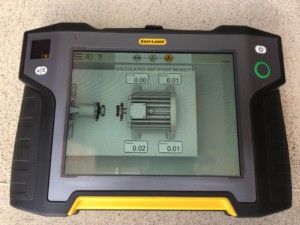
Understanding the CI Process for Asset Strategy.
[Read more…]Your Reliability Engineering Professional Development Site
Find all articles across all article series listed in reverse chronological order.
by George Williams Leave a Comment
by Karl Burnett Leave a Comment

The Street Railway Journal, later renamed the Electric Railway Journal was published from 1884 until 1931. The first 1884 volume described the reason for the journal’s existence, to serve the streetcar industry better than journals focusing on heavy rail. In 1884 it was most common for horses to pull street cars on fixed rails. The importance of animal power was reflected in the articles about managing animals and many advertisements for grooming machines, traces, harnesses, and cures for horse colic. A rarer method of motive power was a steam engine that drove an underground tow cable. The second 1884 volume reported several experiments in using electric motors to power the cable instead of steam.
[Read more…]
The term “reliability improvement journey” is well-established in the chemical process industry. The decade-long, tortuous journey of one company is shown in terms of operational availability (i.e., production) and relative maintenance cost at Figure 1.
[Read more…]
Failure Simulation has confirmed all root causes in the Storm Packer failure analysis. The focus is now on mitigations that prevent them from occurring again.
Mitigations are controls that prevent failures or reduce their probability of occurring. Ideally, an OEM implements mitigations to the product through Design for Reliability (DfR) activities before commercialization. Some mitigations may be best practices in product design. Others may be best practices for installation or maintenance processes. Some have been acquired through FRACAS programs. However, all will be based on institutional knowledge.
[Read more…]by Robert (Bob) J. Latino Leave a Comment

We often hear our organizations referring to their workforce as their greatest ‘asset’. But are they really?
Let’s first define ‘asset’ from a financial perspective:
“In financial accounting, an asset is an economic resource. Anything tangible or intangible that can be owned or controlled to produce value and that is held by a company to produce positive economic value is an asset. Simply stated, assets represent value of ownership that can be converted into cash (although cash itself is also considered an asset)”
[Read more…]by James Kovacevic Leave a Comment
 Imagine (or maybe you don’t have to) that you take out your brand new Easy-Laser system, and proceed to perform a shaft alignment. However, it seems that no matter what you do, you can’t get a great alignment. What is going on? The foundation looks good, new shims were used, the asset is clean, and there is no pipe strain. After some discussion with others, they mention a term in which you are unfamiliar with, soft foot.
Imagine (or maybe you don’t have to) that you take out your brand new Easy-Laser system, and proceed to perform a shaft alignment. However, it seems that no matter what you do, you can’t get a great alignment. What is going on? The foundation looks good, new shims were used, the asset is clean, and there is no pipe strain. After some discussion with others, they mention a term in which you are unfamiliar with, soft foot.
[Read more…]
by James Reyes-Picknell Leave a Comment

Proactive maintenance requires fewer people and is more suited to physical distancing, yet cost-savings measures are driving more reactive work and workplace crowding than necessary. Proactive maintenance is more “Covid”. You have laid-off workers, contractors, and reduced spending on maintenance and parts. In fact, Covid-19 presented you with a great savings opportunity! Have you done anything to make sure those costs stay down though? Short term maintenance cost savings are easy to achieve. but they bite hard later! [Read more…]
by Greg Hutchins Leave a Comment

In David McKee’s book for children ‘Not Now Bernard’, a young boy tries to warn his parents about a monster in the yard, but they’re too busy to pay attention. All they say is ‘not now Bernard’ and ignore him. In the end, the monster eats Bernard and moves into the house, but his parents are still too busy to notice.
[Read more…]by Nancy Regan Leave a Comment

There’s a big difference between MTBF and Useful Life. The two values are often misunderstood and misapplied when assigning Preventive Maintenance task intervals. In this video, I’ll explain which one is used to assign intervals for Scheduled Replacement and Scheduled Restoration tasks. We’ll also discuss Operating Context and how that can affect Manufacturer Recommended Maintenance. This is an “edutainment” video. If you’d like to skip the fun stuff (although I don’t know why you’d want to ☺️), I’ve time stamped the Reliability Moments below. Enjoy!
Read moreby George Williams Leave a Comment

George Williams, CEO of ReliabilityX, explains what an Asset Management System is. If you have any questions or comments please feel free to share them in the comments below. We would love to answer them.
[Read more…]by Steven Wachs Leave a Comment

Many statistical tests and procedures assume that data follows a normal (bell-shaped) distribution.

For example, all of the following statistical tests, statistics, or methods assume that data is normally distributed:
by Robert (Bob) J. Latino Leave a Comment

If you had to give a grade to your current Root Cause Analysis (RCA) initiative, what would it be? How would you come to that conclusion (grade)? The paradox many face with such initiatives is drawing the distinction between compliance and actual effectiveness. What would our RCA grade be based on? In this article we will focus on the key elements to quantifiably measure your RCA initiative, so the organization can focus on the elements of the initiative that are lacking.
[Read more…]
A friend I have been mentoring for quite some time now asked me recently if I had a set of personal expectations I hold myself to. As part of our conversation, I quickly came up with 4 or 5 things and then later on sat down to list out the expectations I try to live by.
I think my parents set the groundwork for what I would consider my list of personal expectations. My Mom and Dad had sound values and I think it’s those values that influence our expectations. With that said, here is my list;
by James Kovacevic Leave a Comment
 As an Enterprise Maintenance Planner, you manage the backlog, provide a maintenance schedule, liaise with Maintenance and Operations, maintain excellent knowledge of the facility and its equipment, and find ways to optimize productivity. Phew! That’s no small to-do list.
As an Enterprise Maintenance Planner, you manage the backlog, provide a maintenance schedule, liaise with Maintenance and Operations, maintain excellent knowledge of the facility and its equipment, and find ways to optimize productivity. Phew! That’s no small to-do list.
Every day, you’re working hard to:
by Carl S. Carlson Leave a Comment

“A thought, even a possibility, can shatter and transform us.” – Friedrich Wilhelm Nietzsche
One of my favorite FMEA facilitation techniques, and one that can significantly enhance meaningful participation from FMEA team members, is called “Asking Thought-starter Questions.”